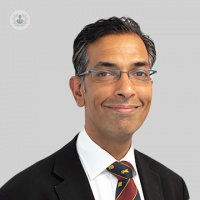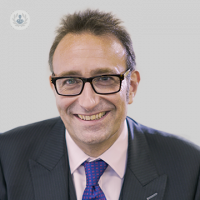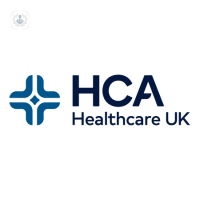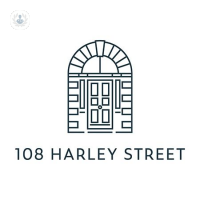What is laparoscopic hernia surgery?
Laparoscopic hernia repair is a minimally-invasive surgery performed with general anaesthesia. A laparoscope is a flexible, thin instrument with a light source and camera on the end. It is inserted through small incisions made in the abdomen, depending on where the hernia is. The surgeon is then able to use this camera to guide the surgical repair.
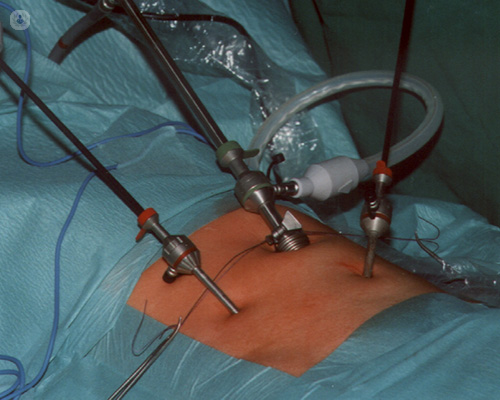
Why is it done?
Laparoscopic hernia surgery is less invasive than open surgery and leaves just three small scars instead of one large one. As a result, there is less pain following surgery and a quicker recovery period. Patients are able to return to normal activities sooner than after having open hernia repair surgery.
What does it involve?
During laparoscopic hernia surgery, the abdomen is inflated with carbon dioxide gas to allow a better view for the surgeon. The surgeon performs the repair of the hernia using stitches and synthetic mesh which provide reinforcement of the abdominal walls. Once repaired, the small incisions are closed with stitches or surgical tape. These stitches will dissolve over time and do not require later removal.
How do you prepare for laparoscopic hernia surgery?
Before laparoscopic hernia surgery is recommended by your specialist, you will have had a thorough physical examination, an MRI scan and an ECG to assess your cardiac health. You will also be given general anaesthesia for this surgery and you won’t feel anything during the procedure. As such, food, drink and certain medications will have to be stopped for a certain period before the operation.
Aftercare
After laparoscopic hernia surgery, patients can normally return home the same day, providing they are not experiencing a lot of pain, nausea or vomiting. You can expect to be a bit sore for the first couple of days after surgery, but this can be managed with rest and painkillers.
You should be able to walk around after surgery, working up to more strenuous activity slowly over the following two weeks. It is important to eat high-fibre foods during recovery to avoid constipation and straining on the toilet.
Alternatives to this treatment
Hernias may also be repaired using open surgery or robotic repair surgery. Open surgery involves a larger incision being made to access the site of the hernia. The hernia is then pushed back into the correct position, reinforced with either stitches or synthetic mesh. Robotic repair is also performed laparoscopically, but the surgeons sits at a special console where they control the movements of the surgical instruments from this console.
06-07-2018 10-02-2023Laparoscopic hernia surgery
Professor Khurshid Akhtar - Surgery
Created on: 06-07-2018
Updated on: 10-02-2023
Edited by: Sophie Kennedy
What is laparoscopic hernia surgery?
Laparoscopic hernia repair is a minimally-invasive surgery performed with general anaesthesia. A laparoscope is a flexible, thin instrument with a light source and camera on the end. It is inserted through small incisions made in the abdomen, depending on where the hernia is. The surgeon is then able to use this camera to guide the surgical repair.

Why is it done?
Laparoscopic hernia surgery is less invasive than open surgery and leaves just three small scars instead of one large one. As a result, there is less pain following surgery and a quicker recovery period. Patients are able to return to normal activities sooner than after having open hernia repair surgery.
What does it involve?
During laparoscopic hernia surgery, the abdomen is inflated with carbon dioxide gas to allow a better view for the surgeon. The surgeon performs the repair of the hernia using stitches and synthetic mesh which provide reinforcement of the abdominal walls. Once repaired, the small incisions are closed with stitches or surgical tape. These stitches will dissolve over time and do not require later removal.
How do you prepare for laparoscopic hernia surgery?
Before laparoscopic hernia surgery is recommended by your specialist, you will have had a thorough physical examination, an MRI scan and an ECG to assess your cardiac health. You will also be given general anaesthesia for this surgery and you won’t feel anything during the procedure. As such, food, drink and certain medications will have to be stopped for a certain period before the operation.
Aftercare
After laparoscopic hernia surgery, patients can normally return home the same day, providing they are not experiencing a lot of pain, nausea or vomiting. You can expect to be a bit sore for the first couple of days after surgery, but this can be managed with rest and painkillers.
You should be able to walk around after surgery, working up to more strenuous activity slowly over the following two weeks. It is important to eat high-fibre foods during recovery to avoid constipation and straining on the toilet.
Alternatives to this treatment
Hernias may also be repaired using open surgery or robotic repair surgery. Open surgery involves a larger incision being made to access the site of the hernia. The hernia is then pushed back into the correct position, reinforced with either stitches or synthetic mesh. Robotic repair is also performed laparoscopically, but the surgeons sits at a special console where they control the movements of the surgical instruments from this console.


Keyhole hernia surgery: Minimally invasive repair for hernias
By Professor Khurshid Akhtar
2024-11-21
Keyhole hernia surgery is a minimally invasive procedure performed using general anaesthetic for the repair of a hernia. Here, Professor Khurshid Akhtar, renowned consultant general and upper GI (gastrointestinal) surgeon, provides an expert insight into keyhole hernia surgery. See more


An essential guide to epigastric hernia repair
By Mr Dominic Coull
2024-11-21
The thought of having an epigastric hernia repair may be overwhelming, especially in the knowledge that surgery is the only option for a serious case. Experienced consultant laparoscopic hernia and colorectal surgeon Mr Dominic Coull has created a reassuring guide to the procedure. Read on to find out more. See more


A comparison between laparoscopic and open inguinal hernia surgery
By Mr Eriberto Farinella
2024-11-20
Here, highly revered and distinguished consultant general surgeon, Mr Eriberto Farinella, describes what laparosopic inguinal hernia surgery is, and compares it to the more open, traditional approach to operating on inguinal hernias. See more
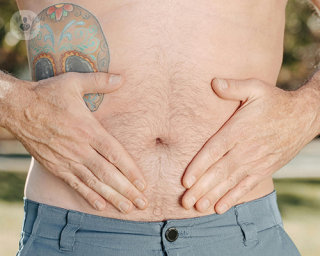

Hernia: the symptoms and treatment
By Mr Myutan Kulendran
2024-11-20
A hernia is when an internal body component, often a part of an organ, starts to extrude through a weakness or fault in the muscle or tissue wall. They are most common in the torso, particularly the abdomen and groin areas. Some hernias can be left alone, but some will need to medical intervention for the comfort and health of the patient. In this article, a consultant laparoscopic general surgeon explains what is a hernia and how it can be treated. See more
Experts in Laparoscopic hernia surgery
-
Mr Sakhawat (Zak) Rahman
SurgeryExpert in:
- Cholecystectomy
- Laparoscopic hernia surgery
- Pancreas surgery
- Inguinal hernia
- Hiatal hernia surgery
- Gallbladder surgery
-
Mr Michael Stellakis
SurgeryExpert in:
- Laparoscopic hernia surgery
- Cholecystectomy
- Colonoscopy
- Irritable bowel syndrome (IBS)
- Hernia
- Gastroscopy
-
Mr Gianluca Bonanomi
SurgeryExpert in:
- Bariatric surgery
- Gallbladder surgery
- Inguinal hernia
- Laparoscopic hernia surgery
- Acid reflux
-
Mr Bruno Sgromo
SurgeryExpert in:
- Upper GI surgery
- Bariatric surgery
- Oesophageal cancer surgery
- Gastric cancer surgery
- Bariatric surgery problems
- Laparoscopic hernia surgery
-
Mr Shashank Gurjar
Colorectal surgeryExpert in:
- Colorectal cancer
- Inflammatory bowel disease (IBD)
- Diverticular disease
- Haemorrhoid surgery
- Anal fistula surgery
- Laparoscopic hernia surgery
- See all

The Outpatients and Diagnostic Centre at 30 Devonshire Street (HCA)
The Outpatients and Diagnostic Centre at 30 Devonshire Street (HCA)
30 Devonshire St, London W1G 6PU
No existe teléfono en el centro.
By using the telephone number provided by TOP DOCTORS, you automatically agree to let us use your phone number for statistical and commercial purposes. For further information, read our Privacy Policy
Top Doctors

GI DOCTORS
GI DOCTORS
116 Harley Street, Marylebone, W1G 7JL
No existe teléfono en el centro.
By using the telephone number provided by TOP DOCTORS, you automatically agree to let us use your phone number for statistical and commercial purposes. For further information, read our Privacy Policy
Top Doctors

108 Harley Street Medical
108 Harley Street Medical
108 Harley Street
No existe teléfono en el centro.
By using the telephone number provided by TOP DOCTORS, you automatically agree to let us use your phone number for statistical and commercial purposes. For further information, read our Privacy Policy
Top Doctors
-
The Outpatients and Diagnostic Centre at 30 Devonshire Street (HCA)
30 Devonshire St, London W1G 6PU, Central LondonExpert in:
- Orthopaedic surgery
- Orthopaedic spinal surgery
- Musculoskeletal pain
- Musculoskeletal ultrasound
- Spinal stenosis
- Spinal injections
-
GI DOCTORS
116 Harley Street, Marylebone, W1G 7JL, W1G Marylebone LondonExpert in:
- Colorectal surgery
- Colonoscopy
- Inflammatory bowel disease
- Gastroenterology
- Hernia
- Irritable bowel syndrome
-
108 Harley Street Medical
108 Harley Street, W1G Marylebone LondonExpert in:
- Vascular Surgery
- Dermatology
- Diagnostic Imaging
- Women’s health
- Sports Medicine
- Rehabilitation
- Most viewed diseases, medical tests, and treatments
- Weight loss injections
- Nipple discharge
- Abdominal pain
- Endovenous laser treatment (EVLA)
- Minimal access surgery (keyhole surgery)
- Head and neck cancer
- Neck lump
- Bariatric surgery
- Acellular dermal matrix (ADM)
- Prepectoral breast reconstruction

